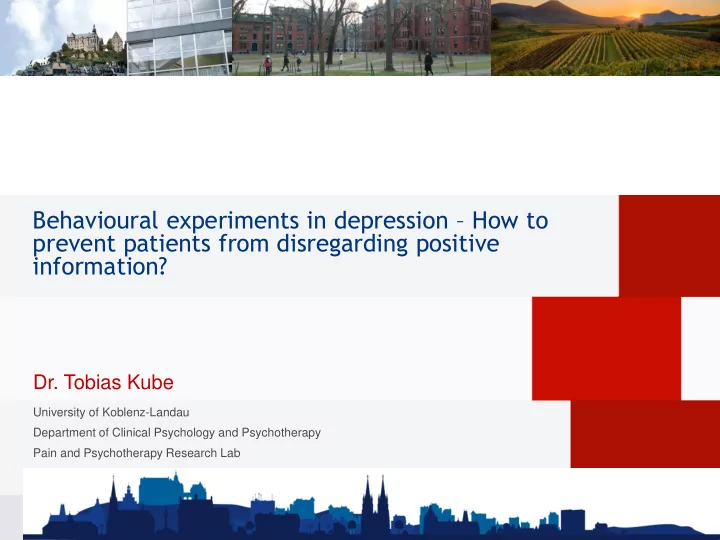

Behavioural experiments in depression – How to prevent patients from disregarding positive information? Dr. Tobias Kube University of Koblenz-Landau Department of Clinical Psychology and Psychotherapy Pain and Psychotherapy Research Lab
Department of Clinical Psychology and Psychotherapy OVERVIEW Lack of updating negative beliefs in depression Cognitive immunisation as a mechanism of persistent negative beliefs Psychotherapeutic strategies to inhibit cognitive immunisation and to facilitate belief update Tobias Kube Pain and Psychotherapy Research Lab 2
Department of Clinical Psychology and Psychotherapy THE PROBLEM OF LACK OF UPDATING NEGATIVE BELIEFS “You have made I am still great progress!” feeling miserable Tobias Kube Pain and Psychotherapy Research Lab 3
Department of Clinical Psychology and Psychotherapy THE PROBLEM OF LACK OF UPDATING NEGATIVE BELIEFS One possible positive outcome of a behavioural experiment is that a negative belief of the patient is positively disconfirmed Therapists assume that this disconfirmation of patients’ beliefs leads to an update of beliefs However, many patients stick to their beliefs and do not update them despite disconfirmatory evidence Tobias Kube Pain and Psychotherapy Research Lab 4
Department of Clinical Psychology and Psychotherapy THE PROBLEM OF LACK OF UPDATING NEGATIVE BELIEFS: EVIDENCE FOR DEPRESSION Kube, Rief , … & Glombiewski (2019) Psychological Medicine 1 individuals with MDD healthy individuals 5,5 Generalised performance expectation 5 * 4,5 4 3,5 3 pre post Provision of unexpectedly * F (1,113) = 5.414; p = .022; ɳ² p = 0.046 positive feedback 1 MDD = Major Depressive Disorder Tobias Kube Pain and Psychotherapy Research Lab 5
Department of Clinical Psychology and Psychotherapy THE PROBLEM OF LACK OF UPDATING NEGATIVE BELIEFS: EVIDENCE FOR DEPRESSION Similar effects have been found for areas other than performance, e.g.: Failure to revise negative interpretations of social situations after novel positive information (Everaert et al., 2018; Liknaitzky et al., 2017) Updating beliefs about future life events (Garrett et al., 2014; Korn et al., 2014) Tobias Kube Pain and Psychotherapy Research Lab 6
Department of Clinical Psychology and Psychotherapy COGNITIVE IMMUNISATION AS A MECHANISM OF PERSISTENT NEGATIVE BELIEFS Cognitive immunisation = reappraisal of disconfirming information such that beliefs become “immune” to learning from new experiences Some examples: Unexpectedly positive performance feedback “This was a particularly easy test, everyone could have done this“ “This test seems invalid, so perhaps I was not as good as indicated“ Unexpectedly positive social interaction: “This person had to be nice to me in this situation” “This person was just pretending to like me. In fact, she does not like me” Tobias Kube Pain and Psychotherapy Research Lab 7
Department of Clinical Psychology and Psychotherapy HOW TO HANDLE COGNITIVE IMMUNISATION THERAPEUTICALLY? Cognitive immunisation is regarded as a specific cognitive mechanism underlying the persistence of dysfunctional beliefs From a clinical point of view, it should be aimed to prevent patients from using cognitive immunisation strategies to devalue unexpectedly positive information gained from a behavioural experiment → increase the likelihood of belief update Disconfirmatory Belief Belief update information Tobias Kube Pain and Psychotherapy Research Lab 8
Department of Clinical Psychology and Psychotherapy HOW TO HANDLE COGNITIVE IMMUNISATION THERAPEUTICALLY? Cognitive immunisation is regarded as a specific cognitive mechanism underlying the persistence of dysfunctional beliefs From a clinical point of view, it should be aimed to prevent patients from using cognitive immunisation strategies to devalue unexpectedly positive information gained from a behavioural experiment → increase the likelihood of belief update Disconfirmatory Belief Belief update information Cognitive Persistent immunisation belief Tobias Kube Pain and Psychotherapy Research Lab 9
Department of Clinical Psychology and Psychotherapy HOW TO HANDLE COGNITIVE IMMUNISATION THERAPEUTICALLY? Cognitive immunisation is regarded as a specific cognitive mechanism underlying the persistence of dysfunctional beliefs From a clinical point of view, it should be aimed to prevent patients from using cognitive immunisation strategies to devalue unexpectedly positive information gained from a behavioural experiment → increase the likelihood of belief update Disconfirmatory Belief Belief update information Therapeutic Cognitive Persistent intervention immunisation belief Tobias Kube Pain and Psychotherapy Research Lab 10
Department of Clinical Psychology and Psychotherapy COGNITIVE IMMUNISATION CAN BE INHIBITED 6 Sample: 113 people with major depression Comparison of three strategies aimed at inhibiting the use of 5,5 cognitive immunisation strategies Generalised performance expectation and facilitating expectation update Particularly the strategy aimed at increasing the value of the positive 5 feedback by providing additional information (“INFORMATION”) about the test effectively boosted expectation change 4,5 INFORMATION RECALL 4 ATTENTION CONTROL 3,5 pre post F (3, 109)=3.758; p =0.013; ɳ² p =0.094 Kube, Glombiewski , … & Rief (2019) Journal of Affective Disorders Tobias Kube Pain and Psychotherapy Research Lab 11
Department of Clinical Psychology and Psychotherapy INHIBITION OF COGNITIVE IMMUNISATION: CLINICAL EXAMPLE Mr. G.‘s expectation: “When I talk to other people they will think I’m incompetent” Possible behavioural experiment: Talk to other people and see what happens Therapist‘s concern: Patient would negatively reappraise possible positive outcome Tobias Kube Pain and Psychotherapy Research Lab 12
Department of Clinical Psychology and Psychotherapy INHIBITION OF COGNITIVE IMMUNISATION: CLINICAL EXAMPLE Inhibition of cognitive immunisation: A priori discussion: “How would we have to design the behavioural experiment so that you find the information gained from it credible ?” Mr. G.: „… Tobias Kube Pain and Psychotherapy Research Lab 13
Department of Clinical Psychology and Psychotherapy THERAPEUTIC STRATEGIES TO INHIBIT COGNITIVE IMMUNISATION When to use it? Strategy A priori specification of valid belief-disconfirming information that can be gained from the behavioural Before engaging in a behavioural experiment experiment Shift the patient’s attentional focus to potential belief disconfirming experiences Consider repeating the behavioural experiment in other situations/contexts to increase its validity After receiving unexpectedly Increase the value of disconfirmatory positive information positive information by emphasising its relevance and credibility Discuss the generalisability of the unexpectedly positive information Kube, Glombiewski, & Rief (2019), Verhaltenstherapie; Kube, Rief, & Barsky (under review) Tobias Kube Pain and Psychotherapy Research Lab 14
Recommend
More recommend